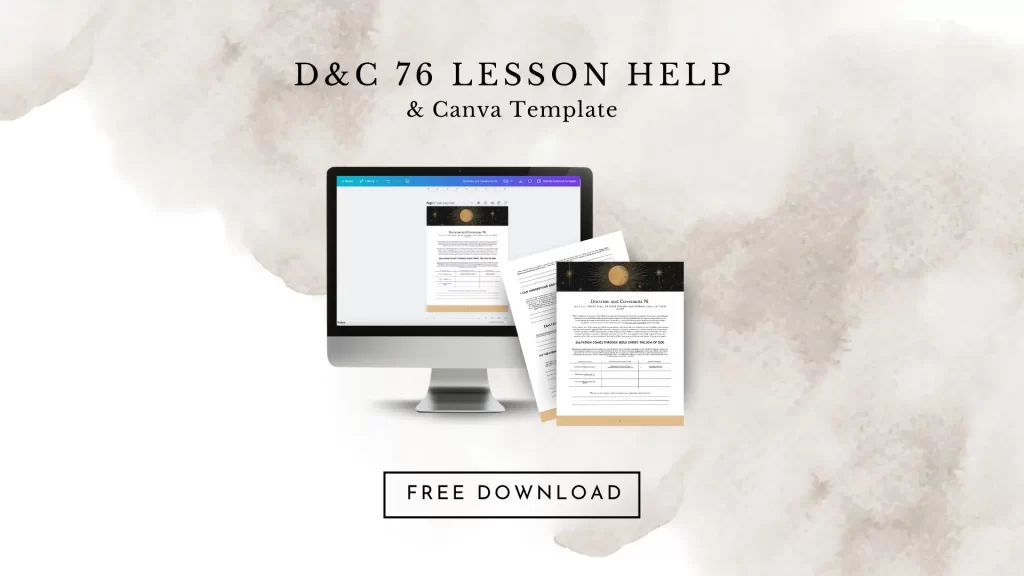
Teaching Doctrine and Covenants 76 in Young Men or Young Women this week is an exciting opportunity to help your youth dive into one of the most powerful visions of the plan of salvation ever recorded. This section reveals deep truths about the degrees of glory, the mercy and justice of God, and the incredible blessings prepared for those who follow Jesus Christ. To help make your lesson meaningful and memorable, we’ve put together a mix of engaging questions, creative object lesson ideas, and personal sharing prompts designed especially for youth. These tools will help spark discussion, invite the Spirit, and help your class better understand their divine potential and God’s eternal plan for them.

To download our free lesson help + customizable Canva Template, click here: https://otherthanamom.myflodesk.com/dc76
Salvation comes through Jesus Christ, the Son of God.
Engaging Questions:
- What does “salvation through Jesus Christ” mean to you personally?
- How does knowing that Christ suffered for you change the way you view Him—and yourself?
- What stands out to you in Doctrine and Covenants 76 about the Savior’s role in our eternal destiny?
- Why do you think the Lord revealed so much about the kingdoms of glory in this vision?
- How does your understanding of Jesus Christ influence the choices you make each day?
- Have you ever had a moment when you felt the Savior’s power saving you spiritually or emotionally?
- What do you think it means to “receive the testimony of Jesus” as mentioned in D&C 76:51?
- How can you help others understand that salvation is available to everyone through Jesus Christ?
- What truths from D&C 76 give you hope when you think about your future or your loved ones’?
- What would you say to someone who feels unsure if Christ’s salvation applies to them personally?
Object Lessons:
1. The Lifesaver (Rescue Analogy)
Materials:
- A life preserver, rope, or even a printed image
Lesson Overview:
Describe someone drowning in water who can’t save themselves. The only way to be rescued is if someone throws a lifesaver. Jesus Christ is our spiritual lifesaver—no one else can pull us from sin and spiritual death.
Discussion Points:
- Why can’t we “save ourselves” without Christ?
- What does it feel like to accept His rescue?
2. The Stained Shirt
Materials:
- A white shirt with a visible stain, a stain remover, and water
Lesson Overview:
Show how you can’t just wipe the stain away with your hand. Only with the right cleanser can the stain come out. Sin stains our souls, and only the Atonement of Jesus Christ can cleanse us and make us whole again.
Discussion Points:
- Why doesn’t trying harder (alone) remove sin?
- How do we apply Christ’s cleansing power in our lives?
3. The Only Bridge
Materials:
- Two platforms (tables, chairs, or drawings) labeled “Us” and “God”
- A plank or sign labeled “Jesus Christ” used to bridge the gap
Lesson Overview:
Explain that sin separates us from God, and no matter how far we jump, we fall short. Jesus Christ is the only bridge back. His Atonement closes the gap and makes salvation possible.
Discussion Points:
- How do we walk that bridge daily?
- What are we doing to help others find the bridge?
4. The Gift You Can’t Earn
Materials:
- A beautifully wrapped gift box
Lesson Overview:
Give the box to someone and explain that it’s theirs—not because they earned it, but because you love them and chose to give it. Salvation is a gift from Christ—we don’t earn it, but we must accept it through faith, repentance, and obedience.
Discussion Points:
- What does it mean to accept Christ’s gift?
- Can someone reject the gift? How?
5. The Map and the Guide
Materials:
- A map and a picture of a guide
Lesson Overview:
You can try to follow a map through difficult terrain, but without a guide who knows the way, it’s easy to get lost. Jesus Christ is not only the map but also the living guide who knows how to get us back to Heavenly Father.
Discussion Points:
- What does following Jesus look like in your daily decisions?
- What happens when we ignore the guide?
6. The Locked Door
Materials:
- A box with a lock, and only one key
Lesson Overview:
Place a meaningful object inside the box (like a heart or scripture). Try using different keys (labeled “good works,” “money,” “popularity”)—none open it. Only the key labeled “Jesus Christ” works. Explain that He is the only way to salvation and eternal life (John 14:6, reinforced in D&C 76).
Discussion Points:
- What are some “false keys” people try to use today?
- Why is Christ the only true key?
Personal Sharing Prompts:
- Think of a time when you felt the Savior’s power to lift and save you. How did that experience deepen your understanding of His role in your life?
- Think of a time when you felt overwhelmed by your imperfections but found hope in Jesus Christ. What reminded you that He is mighty to save?
- Think of a time when you studied or taught about the plan of salvation. How did it help you better understand the central role of Jesus Christ?
- Think of a time when you felt joy in the knowledge that salvation is available to all through Christ. How did that shape your view of others—or yourself?
- Think of a time when you felt the redeeming love of the Savior after repenting. How did that help you feel more fully forgiven?
- Think of a time when someone else’s testimony of Jesus Christ strengthened your own. What did they share that touched your heart?
- Think of a time when you felt comfort knowing that the Savior understands your struggles. How did that help you move forward with hope?
- Think of a time when you read or sang about the Savior and felt your testimony grow. What truth stood out to you?
- Think of a time when you witnessed someone change through the Atonement of Jesus Christ. How did that increase your faith in His power to save?
- Think of a time when you felt the Spirit confirm to you that Jesus Christ is the Son of God. What were the circumstances, and how did that moment affect you?
I can understand God’s will “by the power of the Holy Spirit.”
Engaging Questions:
- What does it feel like when the Holy Spirit teaches you something? How do you recognize it?
- Have you ever had an experience where the Holy Ghost helped you understand God’s will for your life?
- Why do you think spiritual truths—like those in D&C 76—require the Spirit to fully understand them?
- How can you invite the Holy Ghost more into your personal scripture study or prayer?
- What’s one truth about God’s plan that became clearer to you because of the Holy Spirit?
- When life feels confusing, how can you turn to the Spirit for direction and peace?
- Why is it important to be spiritually in tune before asking God about big decisions?
- How do you respond when you receive a prompting you don’t fully understand yet?
- What habits or choices help you stay close to the Spirit so you can hear and feel God’s will?
- What role does faith play when you’re seeking to understand something that doesn’t come easily at first?
Object Lessons:
1. The Radio Tuner
Materials:
- A radio, phone with a tuning app, or a visual of radio dials
Lesson Overview:
Turn the dial slowly until the signal comes in clearly. Explain that God’s will is broadcast spiritually, but we must tune in through the Holy Ghost. Just like static makes it hard to hear music, distractions and sin can muffle spiritual messages.
Discussion Points:
- How do we “tune” ourselves spiritually?
- What causes spiritual static in your life?
2. The Invisible Message (Lemon Juice Ink)
Materials:
- Paper with invisible ink (lemon juice writing)
- Heat source (lamp or iron) to reveal the message
Lesson Overview:
Hold up the paper and say it looks blank. Then apply heat and reveal the hidden message. Just like the Holy Ghost reveals truth, the message was there all along—it just needed the right condition to be seen.
Discussion Points:
- What helps the Spirit “illuminate” God’s will in your life?
- Why is personal revelation necessary?
3. The Flashlight in the Dark
Materials:
- A flashlight and a dark room
Lesson Overview:
In darkness, a flashlight lets you see what was always there. The Holy Ghost is our spiritual light, revealing truth, confirming God’s will, and guiding our steps—especially when we can’t see the full picture.
Discussion Points:
- When has the Spirit helped you understand something deeply?
- How can you better invite that light into your daily life?
4. The Translator
Materials:
- A short phrase in a foreign language
- A “translator” (person or app)
Lesson Overview:
Show a sentence in another language and ask if people understand it. Then “translate” it. Explain that spiritual truths are often not understood by worldly means—the Holy Ghost is like a translator, helping us comprehend God’s messages.
Discussion Points:
- How do you “ask for translation” in spiritual matters?
- Why can’t we rely only on our own understanding?
5. The Foggy Glass
Materials:
- A mirror or glass fogged with breath
- A cloth to wipe it clear
Lesson Overview:
Show how a fogged mirror blurs the reflection. Wipe it clear and show how much easier it is to see. The Holy Ghost clears spiritual fog—revealing what’s true, what’s next, and what’s from God.
Discussion Points:
- What can fog up your spiritual vision?
- How does the Spirit give clarity in decision-making?
6. The Whisper Game
Materials:
- None (just people)
Lesson Overview:
Have a message whispered through a few people until it reaches the last person. The message may get distorted. Explain that without the Spirit, we may misinterpret or miss God’s will. The Holy Ghost gives direct, undistorted truth from God.
Discussion Points:
- How can we better “hear Him” through the Spirit?
- What does it feel like when the Spirit confirms truth?
Personal Sharing Prompts:
- Think of a time when the Holy Spirit helped you understand something in the scriptures. What truth became clearer to you?
- Think of a time when you were confused or unsure, and the Holy Ghost gave you direction. How did the Spirit communicate with you?
- Think of a time when you had to make a difficult decision, and you sought the Lord’s will. How did the Spirit guide your thoughts or feelings?
- Think of a time when you received unexpected clarity or peace while praying. What did you learn about how the Spirit teaches?
- Think of a time when you were taught by the Spirit during a talk, lesson, or study. What insight or impression stayed with you?
- Think of a time when the Spirit confirmed that a choice you made was right. How did that experience help you trust God more?
- Think of a time when you realized the Lord was preparing you for something through spiritual promptings. How did the Spirit guide you over time?
- Think of a time when you saw the Spirit help someone else understand God’s will. What did their experience teach you?
- Think of a time when the Holy Ghost helped you feel that you were known and loved by God. What did that experience reveal to you about His plan for you?
- Think of a time when you felt inspired to act in faith—even before you understood everything. How did the Spirit help you move forward?
Exaltation is the highest form of salvation.
Engaging Questions:
- What do you think the difference is between salvation and exaltation?
- How does understanding exaltation as “the highest form of salvation” affect your goals or perspective on life?
- What does D&C 76 teach you about what it means to become like Heavenly Father and Jesus Christ?
- What qualities or choices do you think help prepare someone for exaltation?
- Why do you think Heavenly Father wants us not just to be saved, but to be exalted?
- How does the idea of eternal family relationships connect to exaltation for you?
- What role does Jesus Christ play in helping us qualify for exaltation?
- When have you felt motivated to live more righteously because of your understanding of God’s eternal promises?
- How can understanding exaltation change the way we treat others?
- What gives you hope or encouragement as you strive for exaltation, knowing it’s a lifelong journey?
Object Lessons:
1. The Ladder and the Top Rung
Materials:
- A step ladder, or a picture of one with labeled steps (telestial, terrestrial, celestial, exaltation)
Lesson Overview:
Use the ladder to illustrate the different kingdoms of glory. Climbing represents progress through faith, repentance, and covenant keeping. Emphasize that the top rung (exaltation) requires more than simply being saved—it requires becoming like God through Jesus Christ.
Discussion Points:
- What steps are required to reach exaltation?
- Why is it important to understand the difference between being “saved” and being “exalted”?
2. The Inheritance Analogy
Materials:
- A will, check, or photo album labeled “Heavenly Family Inheritance”
Lesson Overview:
Explain that being saved is like being rescued—but being exalted is like being made a full heir in a family. We are not only invited to live with God, but to become like Him, receiving “all that He has” (D&C 76:55–59).
Discussion Points:
- What does it mean to be a “joint-heir with Christ”?
- How do our daily choices prepare us for that inheritance?
3. The Wedding Invitation
Materials:
- Two envelopes: one labeled “Party Invite”, the other “Marriage Invitation”
Lesson Overview:
Explain that being saved is like being invited to a party—you’re included and welcomed. But exaltation is like being part of the family—sealed to the Bridegroom (Christ) in a covenant relationship. Exaltation comes through celestial marriage, covenants, and discipleship.
Discussion Points:
- What covenants prepare us for exaltation?
- How does the temple play a role?
4. The Graduation Certificate
Materials:
- A blank diploma or certificate with different honors: “Participant,” “Graduate,” “Valedictorian”
Lesson Overview:
Relate salvation to completing school—you didn’t drop out (telestial or terrestrial), you made it! But exaltation is like graduating with honors—faithfully enduring, going above expectations, and fulfilling your highest potential.
Discussion Points:
- Why does the Lord care about our degree of spiritual growth?
- How can grace and effort work together toward exaltation?
5. The Gift vs. the Reward
Materials:
- A wrapped gift (symbolizing salvation)
- A trophy or medal (symbolizing exaltation)
Lesson Overview:
Explain that salvation is a free gift, made possible by Christ’s Atonement and resurrection—everyone will receive it in some degree. But exaltation is a reward given through discipleship, covenants, and Christ’s enabling power. It’s the highest blessing.
Discussion Points:
- How is exaltation still a gift, even though effort is required?
- What spiritual habits help us qualify?
6. The Mansion Analogy (John 14:2)
Materials:
- Picture of a mansion with many rooms, labeled “Salvation” and “Exaltation”
Lesson Overview:
Use Christ’s teaching in John 14:2—“In my Father’s house are many mansions.” Everyone may enter the house (salvation), but exaltation is like being given your own room prepared by the Savior. It’s not just entry—it’s fullness.
Discussion Points:
- What makes exaltation worth striving for?
- How does D&C 76 deepen your understanding of God’s plan?
Personal Sharing Prompts:
- Think of a time when you felt a deep desire to return to live with Heavenly Father. What helped awaken that longing in your heart?
- Think of a time when you felt motivated to keep a covenant because you understood its eternal purpose. How did that strengthen your commitment?
- Think of a time when you gained a clearer vision of your eternal potential. What experience or truth helped you understand that exaltation is possible?
- Think of a time when temple ordinances helped you feel connected to God’s eternal plan. How did that experience influence your choices?
- Think of a time when you felt joy imagining an eternal family. How did that hope shape the way you live and love today?
- Think of a time when you were comforted by the doctrine of eternal life during a time of loss or hardship. How did that knowledge give you peace?
- Think of a time when you saw someone change and grow toward becoming more Christlike. How did that remind you of the promise of exaltation?
- Think of a time when you realized that the Lord’s commandments are invitations to become like Him. What did you feel about your divine potential?
- Think of a time when you felt the Spirit confirm that God’s promises are real. What helped you believe that exaltation is worth striving for?
- Think of a time when learning about the degrees of glory in section 76 helped you better understand God’s mercy and justice. How did that shape your desire to live a celestial life?
My Heavenly Father wants me to receive eternal life in the celestial kingdom.
Engaging Questions:
- What comes to your mind when you think about the celestial kingdom?
- How does knowing that God wants you to be in the celestial kingdom affect how you see Him?
- What choices are you making now that can help prepare you for eternal life with God?
- Why do you think Heavenly Father wants all His children to inherit celestial glory?
- What role does Jesus Christ play in helping us qualify for the celestial kingdom?
- What does it mean to you to “receive eternal life,” and how is that different from just living forever?
- Have you ever felt the Spirit confirm that God has a personal, eternal plan for you? What was that like?
- What teachings from D&C 76 give you hope about your potential to live with God again?
- What challenges sometimes make it hard to believe you’re worthy of celestial glory, and how do you overcome them?
- What daily habits or spiritual practices help keep your focus on eternal life and your divine potential?
Object Lessons:
1. The Crown and the Robe (Divine Identity)
Materials:
- A toy crown and a white cloth or robe
Lesson Overview:
Hold up the crown and robe, explaining that they represent the royal blessings of the celestial kingdom. Our Heavenly Father sees us as future kings and queens, priests and priestesses (D&C 76:56, 58). Eternal life is not just about living forever—it’s about becoming who we were meant to be.
Discussion Points:
- What does it mean to be a child of God with divine potential?
- What do you think your Heavenly Father hopes for you?
2. The Homecoming Door
Materials:
- A doorway or picture of one
- A “welcome home” sign or family photo
Lesson Overview:
A door symbolizes the way home. Heavenly Father is not just tolerating our return—He’s preparing a place and joyfully waiting (John 14:2). His plan is centered on helping us come home to Him through the celestial kingdom.
Discussion Points:
- How is your journey like a path home?
- What helps you stay focused on that destination?
3. The Map and Destination
Materials:
- A map or GPS screen
- A marked “destination” labeled Celestial Kingdom
Lesson Overview:
Explain that Heavenly Father has given us a plan of salvation like a map. He doesn’t just want us to wander—He wants us to arrive at the celestial kingdom, our eternal home. Jesus Christ is the way (John 14:6).
Discussion Points:
- What are the “milestones” (baptism, temple, covenants) along the way?
- How do you recalibrate when you stray?
4. The Perfect Gift
Materials:
- A beautifully wrapped gift box labeled “Eternal Life” or “Celestial Kingdom”
Lesson Overview:
Heavenly Father has prepared the greatest gift of all (see D&C 14:7)—eternal life. It’s offered freely through Jesus Christ, but we must choose to accept it and live worthy of it.
Discussion Points:
- Why would someone leave a gift unopened?
- What does it look like to “receive” eternal life?
5. The Light Spectrum
Materials:
- A prism, glass of water, or flashlight and CD to show light spectrum
- Label sections as telestial, terrestrial, celestial
Lesson Overview:
Just as white light can be separated into a spectrum, the kingdoms of glory differ in brightness (D&C 76:70–71). The celestial kingdom is brightest, representing the fullness of God’s glory. Heavenly Father wants us to dwell in full light with Him.
Discussion Points:
- What helps you choose “greater light” each day?
- How do God’s commandments lead us toward that glory?
6. The Graduation Analogy
Materials:
- A cap and gown or certificate
Lesson Overview:
Explain that just as students work hard to graduate and reach their full potential, Heavenly Father wants us to spiritually “graduate” and qualify for the highest blessings. He cheers us on, provides help, and celebrates every step of progress.
Discussion Points:
- What is your spiritual “graduation goal”?
- How does the Lord help you reach it?
Personal Sharing Prompts:
- Think of a time when you felt God’s love in a way that made you feel He wanted you to return to Him. What were the circumstances, and how did that change you?
- Think of a time when the promise of eternal life gave you hope or direction. How did that vision help you move forward?
- Think of a time when you felt the Spirit confirm your divine worth and potential. What truth stood out to you in that moment?
- Think of a time when you saw someone else striving to live a celestial life. How did their example inspire you to stay on the covenant path?
- Think of a time when you realized that God’s plan for you is bigger than just this life. What experiences led you to that insight?
- Think of a time when temple worship helped you feel closer to your eternal goals. What did you learn about who God wants you to become?
- Think of a time when you made a choice that brought you closer to your eternal potential. How did it feel to act in harmony with God’s plan?
- Think of a time when you taught or testified about eternal life. What did sharing that truth teach you about God’s desires for His children?
- Think of a time when you prayed to know if Heavenly Father was pleased with you. How did He answer, and how did that affect your testimony?
- Think of a time when you felt that your efforts to live the gospel truly mattered in the eternal scheme of things. What gave you that assurance?




Leave a Reply